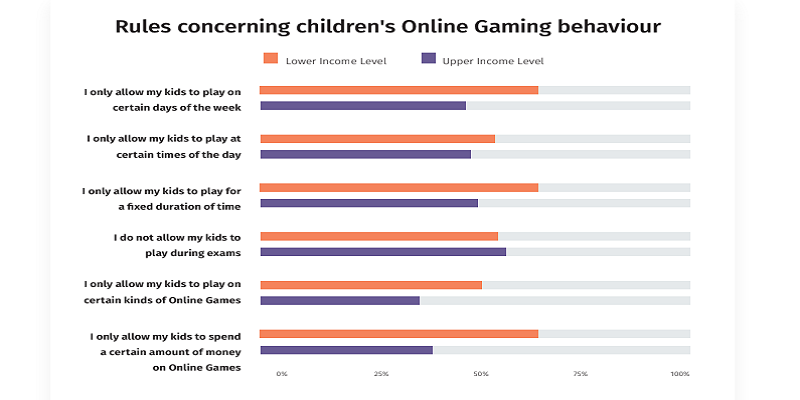
India recorded about 365 million online gamers in the financial year 2020 as per the KPMG report. The reason behind the popularity of online gaming platforms depends on the two factors: firstly, online games draw the users into a virtual world wherein they can play using their alter ego; secondly, the excitement that one derives from playing an online game is just as good as believing that one could be a superhuman albeit on a virtual platform. It is estimated that most kids start playing online games by the age of four or five. Online games are virtually stimulating and so they garner the attention of children at once.
While online gaming caters to various age groups, children, in particular, are especially enamoured by their favourite characters and the extraordinary feats they can showcase. The make-believe adventure does not leave adults behind. However, the more discerning minds might also employ their video-game skills on memory-enhancing or logically stimulating games. YourDOST has recently concluded its study on Indian Parents’ perception of their children’s online gaming. The study aims to discern what Indian parents think about their children engaging in online gaming. The study also analyses the levels at which the risks of online gaming outweigh the benefits for children. Study data of the survey are compiled and analysed from the responses of 429 parents. Findings from the YourDOST study suggest that most parents support their children enjoying online games with certain restrictions.
Here are the key findings:
- 61 per cent parents say that their kids play video games.
- 61per cent of the parents agreed that online games are beneficial to kids where as 23 per cent are unsure and 17 per cent disagree.
- 65 per cent of the parents have played online games themselves and understand why their children play online games. A majority are also interested in learning about online games.
- 60 per cent of the parents also believe that online gaming can be a great stress buster for kids.
- 48 per cent of them believe online gaming is a great way to socialise. Games like PUBG, Fortnite, Minecraft, Call of Duty, CS:GO, and more enable the users to connect with their friends and play together in virtual reality that makes for a virtual networking and socialising environment.
- Nearly 40 per cent parents think that gaming is a profitable career option.
- Above 60 per cent parents think online gaming is a distraction and it requires parental supervision.
- Over 50 per cent of parents think gaming might have dangerous consequences.
- Nearly 50 per cent of parents think online gaming is dangerous and a waste of money.
- 88 per cent feel that online gaming could be addictive.
- 79 per cent think that online gaming can hamper academic performance.
- 74 per cent of the parents feel that online games can cause violent behaviour among children and can have adverse health effects.
- 77 per cent parents feel that online Games expose kids to age-inappropriate content.
- Many parents have found their family lives affected by their children’s gaming; 76 per cent faced frustration in the family due to their kids online gaming behaviour.
- 63 per cent faced arguments and conflicts in the family due to kids online gaming behaviour.
- 62 per cent felt strain in parent-child relationship due to their kid’s online gaming behaviour.
- 78 per cent parents think it’s necessary to place rules for kid’s online gaming behaviour whereas 22 per cent disagreed.
- 62 percent parents allow their kids to play certain type of online games, 63 per cent allow their kids to play video games for fixed duration of time, 76 per cent parents allow their kids to play videogames on designated days of a week.
- 41 per cent in metro cities, 45 per cent in Tier One cities, 46 per cent in other cities: Parents are fearful based on their children’s addiction towards online gaming.
- 36 per cent in metro cities, 39 per cent in Tier One cities, 22 per cent other cities: Parents are fearful based on the impact of online gaming on their kid’s academic performance.
- 28 per cent in metro cities, 32 per cent in Tier One cities, 41 per cent other cities: Parents are fearful based on their children getting exposed to inappropriate content in Online Gaming.
- 77 per cent entrepreneurs strongly feel that online gaming can be beneficial for their kids. Most entrepreneurs play skilled games like Sudoku to help them develop their skills in sharpening their brain and develop their strategic thinking. As they are aware of this, they will want their children to also develop these skills through online gaming. Following that, 55 per cent working professionals, 53 per cent housewives and 35 per cent unemployed/retired and others strongly feel that online gaming can be beneficial for their kids.
- Income can influence the online gaming behaviour of children and also that of parents. It is noticed that people with higher income tend to understand why kids play online games compared to people with lower income. This could be because people with lower income might be constantly worried that their children might waste a lot of time in the games and might not focus on their academics and get a good career in the future. This will lead them to establish a lot more rules which can make children more frustrated or rebellious and that leads to more frustration in the family as they might have constant arguments with their children regarding their online gaming behaviour.

As per the study, it is not just children who are affected but games also have an impact on the family. There can be an increase in frustration in the family and this leads to constant arguments among parents and children. But this can be avoided by laying flexible ground rules which will help parents and children maintain a good boundary. From the current study, it is seen that most parents are aware of the benefits and the hazards related to online gaming. This awareness will help most parents to lay a flexible ground-rule where children will be benefited and are also less prone to addiction.
